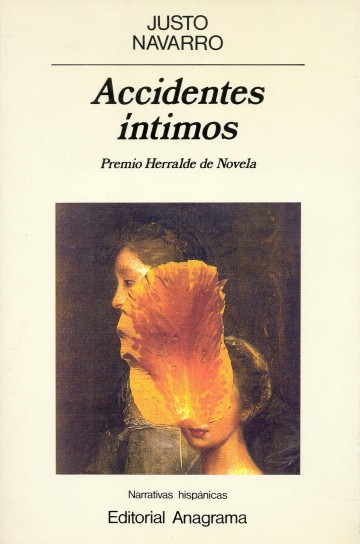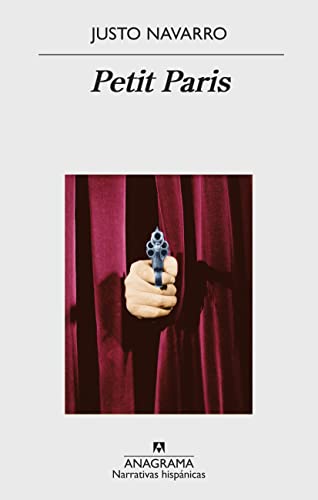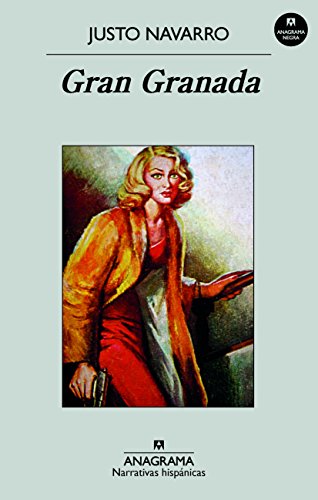In Justo Navarro we enjoy a veteran of Spanish letters who is not given to any specific genre. Because the one who puts the genuine first, be it formal avant-garde or deep introspection, ends up writing when the most authentic need to start writing bids with that I don't know what's unpredictable.
The noir genre falls short for Justo Navarro. Because his characters go beyond the current case and end up accusing the social fabric itself for its grotesque and inexhaustible deformities in the image and likeness of man; or to existence itself as the motor of all the faults in the world. His Commissioner Polo is more than just a researcher, he is a man confronted with violence as a livelihood, as that atavistic foundation of the human in society.
But there is also poetry, which I certainly have not approached, and a surprising surrealist vision or at least an almost cubist structure to present us with other types of stories that are destructured to provide new focuses to be discovered in perspective. A kind of gift that few authors know how to handle and that is not usually for the majority of readers. But surely works like The soul of the air traffic controller they are worth reading and re-reading with intricate curiosity.
Top 3 recommended novels by Justo Navarro
intimate accidents
There are words that would never coexist together if it were not for the precisely rugged nature of the writer's imagination. Titles that by boat could soon go from «Defeat notices" until "The bonfire of the vanities» going through «The conspiracy of fools» or this «Intimate accidents». The question is to make completely unknown words in a normal speech, close collaborators towards surprise. In this case, as a prelude to the deepest estrangement of what is being told to us.
A woman tries to commit suicide in a hotel room and her act reveals the disturbing nature of her relationships with those around her, the artifice of friendship, the difficulty of establishing solid ties with others and of finding meaning in an existence whose Interstices corrode everyday certainties.
intimate accidents It is the chronicle of an estrangement: when the friend of the failed suicide bomber faces the facts, things suffer a loss of meaning and at the same time a mysterious process of fascination with the enigmatic personality of the suicide bomber begins to take place. The pieces of reality, like those of an undone puzzle, lose contact with each other, they become disordered. The present becomes a distorted resonance of an inescapable past, familiar objects populate a territory of exile where no one gets to know each other because no one is who they appear to be. In the end, the search for a lost balance may require infidelity and lies to rebuild a precarious stability...
Aintimate incidents constitutes a lucid exercise in perception, a meticulous vision of a habitual world that, from a concrete fact, distances itself from the coordinates of habit and becomes opaque, alien, ironic and, nevertheless, omnipresent with the intensity of an untamed reality .

Little Paris
Justo Navarro's noir is of a historical revisionism in pursuit of the freest interpretation of a XNUMXth century history full of shady spaces sheltered by cold wars, espionage, icy horizons and sinister shadows that never end between nationalisms, ambitions and other excuses of power.
Paris, March 1943: Germany and Italy are losing the war. After the Anglo-American invasion of North Africa and the surrender in Stalingrad of Field Marshal Paulus, the nazi-fascist military catastrophe is in the air, the imminent landing of the allies in Europe. Twenty years before solving the crimes on which Gran Granada revolved, Commissioner Polo finds himself in Paris by accident, afraid of never being able to finish a trip that was only going to last a few days. In times of war, it is not uncommon for what was planned as a seventy-two-hour excursion to stretch out for months, years or decades, or become eternal exile.
And Polo moves in a small Paris, Petit Paris, full of dangerous people: lawyers and journalists who carry out police work in the consular services of Spain, Gestapo collaborators on the hunt for Spanish Republicans on the run. Among the personnel of the Spanish squad, three violent deaths have occurred in less than a month, and in the center appears the possible suicide of the beautiful Matthias Bohle, a seducer with an enigmatic life who, under another name, had conquered Granada in 1940, including the irreducible commissioner Polo, and who ended up in Paris after stealing four kilos of gold from an industrialist who perhaps commissioned him to smuggle it out of Spain.
Soon Polo will begin to investigate his death, helped by collaborators who are as insecure as everything in the city: the lawyer Palma, almost a double of Polo rejuvenated forty years and with a Gestapo card, who has discovered the fountain of youth in a mixture of gin, Dubonnet and amphetamines; Alodia Dolz, heroine of the National Crusade, agent of the Fifth Column, who survived three years of reckless clandestine activities in red Madrid: "If they hadn't killed her then, they would never kill her again." Polo's Petit Paris is pure black, a city of disturbing moral ambiguity where everyone lies and manipulates as the only way to survive. A dazzling and magnetic narrative –with tributes to Simenon, Leo Malet and Modiano– that plays with the springs of genres such as police and spy to take them further.

Great Granada
The chronology of Commissioner Polo is narrated in the opposite direction to natural time. Because many times it is better to discover the character already loaded with all his baggage that is disconcerting in behavior and attitude towards events. Even more so in the case of a researcher like Polo. Then new works will arrive with the reasons for the particular modus operandi...
1963: a lawyer wakes up dead in a hotel, in the great gray Granada of the year of the flood, and the suicide bombers will gradually wrest the monopoly of violent death from the police. If reality were less real than cinematographic, we would talk about the case of the suicidal bachelors. How does old Commissioner Polo, telecommunications engineer, visionary of surveillance, prophet of television and telephone espionage, see it from his thirteen-diopter glasses? A good man, he salutes the future transformation of the Police State into a Police Society.
Wanting to know everything, he knows that beyond a certain limit it is better to believe than to find out, and he investigates some deaths that can in no way be murders: the head of state and his carousel of hierarchs are about to disembark in the flooded province. There are two women. There are two close friends, belonging to what the more witty of the two calls the homosexual circle: the single-sex world, exclusively masculine and patriarchal, of those who run the cryptic city. These are the happy years of electronic Anglo-Americanization and the Soviet-American conquest of space, pinball and jukebox, the origin of the future, and the guarantors of the Law do not hesitate to use crime to safeguard order.

